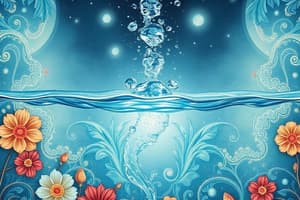Podcast
Questions and Answers
What is the universal solvent?
What is the universal solvent?
- Ethanol
- Water (correct)
- Oil
- Acetone
What is a solvent?
What is a solvent?
A substance that dissolves other things in a solution.
What is a solute?
What is a solute?
The substance being dissolved in a solution.
What is a solution?
What is a solution?
What is a polar molecule?
What is a polar molecule?
What is a nonpolar molecule?
What is a nonpolar molecule?
What are the two elements that make up a water molecule?
What are the two elements that make up a water molecule?
What kind of electrical charge does oxygen have in a water molecule?
What kind of electrical charge does oxygen have in a water molecule?
What kind of electrical charge does hydrogen have in a water molecule?
What kind of electrical charge does hydrogen have in a water molecule?
Which molecule is the bigger circle in a water molecule - hydrogen or oxygen?
Which molecule is the bigger circle in a water molecule - hydrogen or oxygen?
Which molecule are the two smaller circles in a water molecule - hydrogen or oxygen?
Which molecule are the two smaller circles in a water molecule - hydrogen or oxygen?
What is a suspension?
What is a suspension?
Flashcards are hidden until you start studying
Study Notes
Universal Solvent Concept
- Water is known as a universal solvent due to its ability to dissolve a wide variety of solutes.
Key Definitions
- Solvent: The component in a solution that is present in the greatest amount; responsible for dissolving other substances.
- Solute: The substance that is dissolved in a solution, typically present in lesser quantity compared to the solvent.
- Solution: A homogeneous mixture formed when a solute is dissolved in a solvent.
Molecular Properties
- Polar Molecule: Water is classified as a polar molecule due to the presence of a partially positive charge on the hydrogen atoms and a partially negative charge on the oxygen atom.
- Nonpolar Molecule: A molecule that does not exhibit any electrical charge separation, lacking distinct positive and negative ends.
Water Molecule Composition
- A water molecule consists of two elements: hydrogen and oxygen.
- Oxygen in a water molecule carries a negative charge, creating a polar structure.
- Hydrogen atoms in water have a positive charge and are smaller in proportion compared to oxygen.
Molecular Structure
- In a water molecule, the larger circle represents oxygen, indicating its larger atomic size.
- The two smaller circles in the water molecule represent the hydrogen atoms.
Suspension Concept
- A suspension occurs when one liquid floats on top of another liquid, illustrating the differences in densities or chemical properties.
Studying That Suits You
Use AI to generate personalized quizzes and flashcards to suit your learning preferences.



